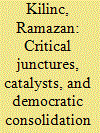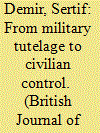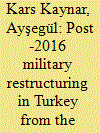|
|
|
Sort Order |
|
|
|
Items / Page
|
|
|
|
|
|
|
| Srl | Item |
| 1 |
ID:
133225


|
|
|
|
|
| Publication |
2014.
|
| Summary/Abstract |
IN FEBRUARY 1997, THE TURKISH MILITARY INTERVENED in politics to protect secularism from the "rising Islamist threat." This intervention resulted in the toppling of the coalition government led by the Islamic-oriented Welfare Party (RP, Refah Partisi). Many civil and political restrictions followed this intervention, including the closure of the RP by the Constitutional Court. Two years later, the Chief of Staff, Hüseyin K?vr?ko?lu, stated that "the 28 February process," by which he meant the military-sanctioned political configuration,would continue for one thousand years if necessary.1 However, by 2012, only 15 years after the intervention, the military's ability to shape politics has diminished notably. By any measure, the civilian oversight of the military is now at its highest level since the first military coup in modern Turkey in 1960.2 The Islamic-oriented Justice and Development Party (AK Party, Adalet ve Kalk?nma Partisi)3 stayed in power for more than a decade. Furthermore, Turkey implemented several democratic reforms that reversed the authoritarian movement of the period immediately after the 1997 military intervention. Additionally, the Parliament passed laws that liberalized the Press Law, Turkish Penal Code, the state policies toward religious minorities, rights for Kurdish minorities, and human rights regulations.4 Since Turkey transited to multi-party politics in 1945, it has experienced four military interventions (1960, 1971, 1980, and 1997); each time, the military built a political system that maintained its influence even after the transfer of power to civilian government. Given Turkey's long history with military tutelage, including its orchestrated effort to redesign Turkish politics in the late 1990s, these liberalizing reforms have been revolutionary for democratic consolidation. Therefore, it can be asked: How did Turkey recover and consolidate its democracy within such a short period?
|
|
|
|
|
|
|
|
|
|
|
|
|
|
|
|
| 2 |
ID:
173349


|
|
|
|
|
| Summary/Abstract |
The Turkish Armed Forces (TAF) have been the main discussion topic in the political arena over the last decade in Turkey, with a focus on curtailing military supervision over political life. This article investigates the evolution of civil–military relations (CMR) in Turkey. Thus, the aim of this study is to explore the factors and dynamics that have led to the development and realignment of CMR in Turkey. The focus will be on how military tutelage in Turkey has been ended, what factors have caused this and finally whether Turkish CMR have been normalized.
|
|
|
|
|
|
|
|
|
|
|
|
|
|
|
|
| 3 |
ID:
166808


|
|
|
|
|
| Summary/Abstract |
The Tatmadaw (the Myanmar armed forces) and the Royal Thai Armed Forces (RTAF) are two of the most resilient and enduring politically active militaries in the world, engaging in a decades long process of the institutionalization of a system of military tutelage. There are, however, significant differences in the strategies pursued and the degree of success achieved in each. These variations are due to the combination of three factors creating the environmental context within which they have pursued these projects: (1) the existence of political allies and cohesiveness of the military; (2) degree of unification of domestic opposition elements against them; and (3) international pressures and influences. Based on a Historical Institutionalist perspective, this paper will map the interplay of these factors over time within each case to explain the different pathways these projects have proceeded. With a lack of allies, a fragmented opposition, and various degrees of international pressure the Tatmadaw has been unsuccessful in creating a durable system of tutelage, resulting in lengthy periods of direct rule while attempting wholesale recreations of the state. In Thailand, the RTAF’s alliance with the Monarchy combined with a fragmented but at times united opposition and weak international pressure has resulted in frequent coups to remove elected governments, but usually for short durations resulting in their limited institutionalization into the political system. The current democracy projects in both states, in part due to domestic and international pressures, are not about replacing but rather embedding the military’s involvement in the political system, though their freedom of action has been constrained to a certain extent. Myanmar and Thailand are best characterized as perpetual transitions as an intentional project to maintain a defective-democratic, tutelary system. Defective in that the military maintains the prerogative to involve itself in electoral politics and tutelary in that the military has cordoned off reserve domains of policy which ensure the system, regardless of who is in charge, supports their interests.
|
|
|
|
|
|
|
|
|
|
|
|
|
|
|
|
| 4 |
ID:
145620


|
|
|
|
|
| Summary/Abstract |
Military influence on political life in Turkey is a widely known phenomenon in civil-military relations (CMRs) literature, and there are multiple studies reviewing Turkish military tutelage and its roots in the light of the theories developed in this field. However, dynamics of the increasing civilian control over the armed forces in the last decade still serves as a field for further studies. As put forward in CMRs theories, civilian control can be established and maintained through formal arrangements and informal practices. The source of power required to make changes in CMRs is also emphasized along with these control mechanisms. Following the coup in 1980, limited demilitarization process in Turkey was carried out partly with the help of the civilian leaders' personalities and partly with the support of the European Union membership procedures, which has been ineffective since 2005. How civilianization was accomplished since then still needs to be clarified. This article aims to explain the factor(s) that enabled the civilians to gain full control over the armed forces in this period. As a result, the role of popular support is identified as the leading factor for designing formal and informal mechanisms to control the military in Turkey since 2007.
|
|
|
|
|
|
|
|
|
|
|
|
|
|
|
|
| 5 |
ID:
185545


|
|
|
|
|
| Summary/Abstract |
This article focuses on the post-2016 military reforms and examines the meaning of civilian oversight and control that these reforms have brought. For almost two decades, the establishment of civilian supremacy over the military has been discussed in terms of democratic control of the armed forces. The article claims that although the post-2016 reforms installed civilian supremacy, they diverge from this approach significantly. Instead, they display the basic characteristics of coup-proofing strategies. The article aims to ignite scholarly interest in and initiate discussions on the conceptual appropriateness of the notion of coup-proofing for capturing Turkey’s civil–military relations since 15 July 2016.
|
|
|
|
|
|
|
|
|
|
|
|
|
|
|
|
|
|
|
|
|